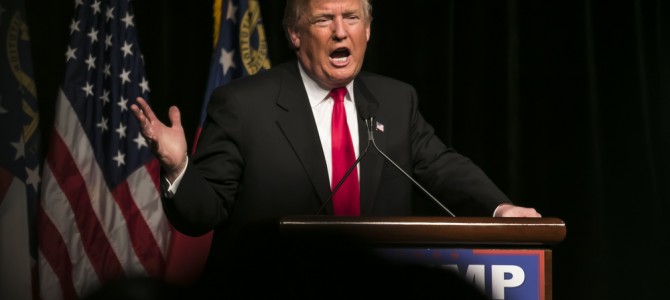
By the end of a statewide assembly on Saturday, Sen. Ted Cruz swept up all of Colorado’s 34 delegates to the Republican National Convention. Donald Trump received none. Trump and his supporters aren’t taking it well. While Colorado Republicans have long held assemblies to pick nominees for various offices, this past year the party decided to cancel its traditional presidential preference poll component after the national party changed its rules to require a state’s delegates to be bound to support the candidate who wins the caucus vote. The decision was made in August of last year, giving campaigns plenty of time to prepare for the change.
Here’s how the Tiger Beat For Trump Drudge Report is handling this latest failure on the part of the Trump campaign to go through the process of winning actual delegates:

Also this sober and totally not-insane analysis:
Does George Bush have to invade Colorado to make it a Democracy? STUNNING Republicans had NO PRIMARY or CAUCUS. At least Dems are faking it!
MATT DRUDGE (@DRUDGE) April 11, 2016
Colorado did hold caucuses, in fact. Last month. There they chose delegates to county assemblies. From there, delegates were chosen for congressional district assemblies as well as the state assembly. Party business, including nominations for elected offices and other important decisions, were decided at the various assemblies.
Trump responded to his failure to secure a single delegate with:
How is it possible that the people of the great State of Colorado never got to vote in the Republican Primary? Great anger – totally unfair!
Donald J. Trump (@realDonaldTrump) April 11, 2016
Also:
The people of Colorado had their vote taken away from them by the phony politicians. Biggest story in politics. This will not be allowed!
Donald J. Trump (@realDonaldTrump) April 11, 2016
A Tale Of Two Republican Voters
Larry Wayne Lindsey is a Republican voter from Douglas County. Lindsey, an enthusiastic supporter of Donald Trump, posted videos to social media this weekend after he showed up at the state assembly and was told he wasn’t registered to attend. He had no evidence that he was a delegate, but claimed that he was being disenfranchised. Even worse, in the video he seems to claim that he was specifically turned away because he was going to vote for Trump.
In fact, according to a series of conversations with party officials, while Lindsey did show up to his precinct caucus and was elected as a delegate to the county assembly, he never showed up to the county assembly, or, at the very least, never signed in for his credentials. On Facebook, he erroneously claimed he’d been elected as a delegate to the state assembly from his precinct caucus, something that is not possible under the rules in Douglas County.
“Since Mr. Lindsey did not attend the County District Assembly he was not elected to be a delegate to the State Assembly, nor could he have been, so there is no way that he would have been listed as a delegate to the State Convention when he tried to check in on Saturday morning,” Tanne Blackburn, chairman of the Douglas County Republican Party, explained in a press release.
He’s blaming his own comprehension failures on the Colorado Republican Party and claiming the party targeted him for being a Trump voter. In truth, he wasn’t even a delegate to the state assembly to begin with. Nevertheless, he promises that he “will raise holy hell” and is “sick to death” of Douglas County Republicans and “ashamed” of being a Republican.
Compare Lindsey to Trey, a 36-year-old Denver man with some interest in Republican politics. When the Colorado GOP canceled their 2016 preference poll, sticking to allocating delegates by assemblies, he wasn’t elated. But he knew what to do. Trey, who asked The Federalist that his last name not be used out of privacy concerns, attended his precinct caucus on March 1. There, he and other Republicans in his neighborhood chose a district captain and four delegates to go to a county assembly. He was one of the delegates so chosen. On March 19, he attended his county caucus. They met at a middle school nearby and elected delegates to go to a congressional assembly and state assembly. Delegates to the Republican National Convention would be elected from both of those assemblies. If you wanted to be a delegate to the national convention, you had to fill out a form and email it to a state Republican official, noting whether you would be pledged to a particular presidential candidate or not.
On April 2, Trey attended his Congressional Caucus, where he and his fellow Republicans elected three Cruz-supporting delegates and three alternates to the Republican National Convention. They also made decisions on party business and nominated Casper Stockham, who will run against incumbent Rep. Diana DeGette for Congressional District 1. And, finally, Trey was a delegate to the Colorado Republican assembly in Colorado Springs on Saturday. He paid a fee to attend the county, congressional and state assemblies to which he was elected — ranging from $12 to $65 or so.
In the lead-up to those assemblies, he received communications about logistics. Since all campaigns had access to delegate emails, he received communications from campaigns seeking his vote. The Cruz campaign was very organized. They set up a CruzColorado.com site, with an easy-to-navigate interface that allowed delegates to quickly see who was on the Cruz slate for each assembly. The Trump campaign wasn’t visibly organized. Trey did, however, receive a few emails from Trump delegates and unofficial Cruz supporters. The Trump campaign issued error-filled ballots that caused problems for his supporters. In the end, each and every Cruz-slate delegate won easily. Trey was pleased. He still doesn’t mind primaries, although he now says they need to be closed to Republican voters only. But the caucus, as time consuming as it was, worked as well.
“I initially thought a primary would be better. Now when I look at it, the people who really care about it and think about it, they’re going to be more involved. The caucus is a pretty good system. It promotes people who are engaged and understand what they’re voting for,” Trey said.
Trump’s Delegate Game Is A Disaster
Trump’s campaign strategy of emphasizing his ability to win has been a good one. It’s a bit circular — “Vote for me because I win” — but it’s worked well enough to get him just over one-third of Republican-contest votes. However, if he wants to actually achieve victory for the whole enchilada, he needs to do much better. Sometimes he can win a state contest simply with the able assist provided by a compliant media that blushes whenever Trump pays attention to it. But other times it requires even just a little bit of work.
Trump has done very well when states allocate delegates through an open primary that enables Democrats and independents to support him. He’s done far less well securing delegates to the Republican National Convention (the actual entity that nominates the party candidate for president) when votes are limited to actual Republicans.
Donald Trump says he will make for an amazing and terrific president. But how is going to be an awesome president when he can’t even run a mildly functional operation in Colorado? Caucus-based assemblies are more difficult to win than open primaries, granted. But it’s not like this is brain surgery. It’s entirely doable with just a little bit of understanding about how delegate allocation works.
It’s not just Colorado, of course. Trump had no ground game in Wyoming, which picks delegates in a manner similar to Colorado. And because he didn’t understand how the delegate process worked in other locations, he had completely unnecessary struggles in South Carolina, Iowa, Indiana, North Dakota, North Carolina, Tennessee, Louisiana, South Dakota and Georgia. In Louisiana, his campaign’s cluelessness about party politics might mean he has 10 fewer delegates than Cruz, even though he edged Cruz out in the popular vote.
Whining isn’t winning. If Trump wants to secure the necessary delegates to win the Republican nomination when the National Convention assembles for its first vote, he needs to drop the ineffectual and impotent cry of “unfairness” and start learning the rules to the game he’s trying to win.









